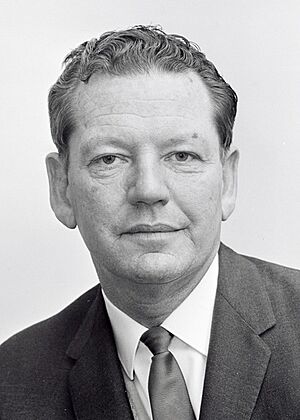Don Willesee facts for kids
Quick facts for kids
Don Willesee
|
|
|---|---|
 |
|
| Minister for Foreign Affairs | |
| In office 6 November 1973 – 11 November 1975 |
|
| Prime Minister | Gough Whitlam |
| Preceded by | Gough Whitlam |
| Succeeded by | Andrew Peacock |
| Vice-President of the Executive Council Special Minister of State |
|
| In office 19 December 1972 – 30 November 1973 |
|
| Prime Minister | Gough Whitlam |
| Preceded by | Alan Hulme |
| Succeeded by | Frank Stewart Lionel Bowen |
| Leader of the Opposition in the Senate | |
| In office 17 August 1966 – 8 February 1967 |
|
| Preceded by | Nick McKenna |
| Succeeded by | Lionel Murphy |
| Senator for Western Australia | |
| In office 22 February 1950 – 11 November 1975 |
|
| Preceded by | Robert Clothier |
| Succeeded by | Ruth Coleman |
| Personal details | |
| Born | 14 April 1916 Derby, Western Australia |
| Died | 9 September 2003 (aged 87) Joondalup, Western Australia |
| Political party | Labor |
| Spouse |
Gwendoline Clarke
(m. 1940) |
| Relations | Bill Willesee (brother) Janet Shaw (granddaughter) |
| Children | 6 incl. Mike and Terry |
| Occupation | Postal clerk |
Donald Robert Willesee (born April 14, 1916 – died September 9, 2003) was an important Australian politician. He was a member of the Australian Labor Party (often called Labor). He worked as a Senator for Western Australia from 1950 to 1975.
He held important jobs in the government led by Gough Whitlam. He was the Special Minister of State (1972–1973). Later, he became the Minister for Foreign Affairs (1973–1975). He also served as the Leader of the Opposition in the Senate from 1966 to 1967.
Contents
Early Life and Work
Willesee was born in Derby, Western Australia. His parents, Ethel May and William Robert Willesee, were from South Australia. His older brother, Bill Willesee, also became a politician.
Don went to school in Carnarvon. He left school at 14 because his father and brother lost their jobs during the Great Depression. He started working as a postal clerk in Carnarvon. He quickly joined the Australian Union of Postal Clerks and Telegraphists. He later became the state leader of this union. He also worked as a telegraphist in Perth. In 1940, he married Gwendoline Clarke.
Political Journey
Willesee joined the Australian Labor Party when he was 21 years old. In 1950, at age 33, he was elected as a Senator for Western Australia. He was the youngest Senator at that time.
He worked closely with Gough Whitlam to improve the Labor Party. This helped the party get ready for the 1972 election. Many people believed he helped make the Labor Party strong enough to form a government.
Ministerial Roles
After the 1972 election, Willesee was given several important roles. He became the Special Minister of State. He was also the Vice-President of the Executive Council. These roles meant he helped the Prime Minister and the Minister for Foreign Affairs. As Special Minister of State, he supported creating a computer system for libraries. This system connected national, state, and university libraries. It is still used today.
On November 30, 1973, he became the Minister for Foreign Affairs. This was a very important job. He was in charge of Australia's relationships with other countries. He worked to improve Australia's connections with countries in Asia.
Willesee believed Australia should be practical in how it dealt with other nations. In 1974, he said that a government's main job is to understand the world as it truly is. He felt Australia should not just wish for things to be different.
New Embassies
This practical approach led to several actions. On February 26, 1973, Willesee helped Australia recognize the Democratic Republic of Vietnam. An Australian Embassy was opened in Hanoi in July 1973.
New embassies were also opened in other countries. An embassy was set up in East Germany in March 1975. Another was opened in Pyongyang, North Korea, on April 30, 1975.
East Timor
Willesee did not agree with Indonesia's actions in East Timor. He believed the people of East Timor should decide their own future. He felt Australia should not try to influence them towards Indonesia. He did not run for re-election in the 1975 election.
Later Life and Legacy
Donald Willesee passed away in Joondalup Hospital on September 9, 2003. He was 87 years old. He died two weeks after having a heart attack. He was survived by his wife, Gwen, and their six children. These included his sons Mike and Terry. His granddaughter, Janet Shaw, is an author and cyclist.
At the time of his death, he was the last living Senator from the group elected in 1950.
Many people spoke highly of him after he passed away. The Prime Minister at the time, John Howard, said Willesee was a friendly, kind, and honest man. He was respected by politicians from all parties.
Simon Crean, who was the leader of the opposition, also shared his thoughts. He said Don was a great person with strong honesty. He was loved by his team. Crean added that Willesee was a passionate Labor supporter who always remembered the struggles of the Great Depression. He was known for helping homeless children.

